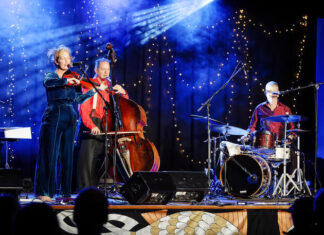Andrew Mathieson
NOBLE knights upholding the law during medieval times is a tale Joan Scott often likes to tell.
She’s quick to explain how they were the honourable protectors of a once unruly society.
“The knights had been in vogue since around 1200 since Richard the Lionheart ruled England,” Joan recites.
“They were actually called custodes and have evolved over hundreds of years.
“They have become a Justice of the Peace and it’s a position to be proud of in the community and it’s a position that’s still very honourable.”
The unassuming Grovedale retiree plays her small part in protecting citizen’s rights, although she’s ditched the shiny armour and swashbuckling horse for a lone table at a police station.
Joan, approaching her 20th year as a modern-day JP, witnesses statutory declarations, affidavits, divorce papers and certifies the legitimacy of copies of original documents.
But nowadays it’s as much about relationships as it is about the law.
“As a justice of the peace, people come in and tell you their heartfelt problems,” she says.
“That’s very humbling.”
For someone who is not a lawyer – in fact, a former hospital administrator – Joan is something of a legal boffin.
She needs to be.
For 12 of her JP years, Joan was also an unpaid bail justice after the tough duties for all Justices of the Peace were removed in 1984.
A bail justice administers remand and bail applications, usually in the middle of the night and in place of an absent police sergeant.
Joan can recount endless occasions waiting beside the phone.
“Sometimes you think you’re dreaming when it calls and you’re asleep,” she laughs.
Joan would slowly creep into the police station and wait for the accused to be brought in.
The cops would read the facts behind the charge and Joan would meticulously analyse the evidence.
“On my first job I was so nervous I couldn’t talk,” she sheepishly admits.
“My tongue was stuck to the bottom of my mouth.
“People think I’m something like a supersonic lawyer but, I must say, the first one was the hardest I ever did.”
Joan’s toughest decisions were whether to bail the accused and what sort of conditions should apply.
Some who fronted Joan were happy to face her rather than a cranky magistrate.
That’s because she liked to maintain a motherly disposition.
But she could still talk tough.
“I’ve had a couple of murders,” Joan remembers.
“Murders are easy because they just don’t get bailed.
“Drugs are more difficult because it often depends on the weight of the pure drugs.”
Despite once holding the district’s chairperson role for Royal Victorian Association of Honorary Justices, Joan has mostly kept her extraordinary array of rendezvous under wraps.
Like an executioner, it wasn’t out of ethics but out of consideration for others’ fear of the law.
“I never spoke to anybody about what I was doing or who I was dealing with,” Joan sighs.
“It’s not something you talk about.
“I would have frightened the hell out of everybody if they only knew.”
Keeping the peace
Digital Edition
Subscribe
Get an all ACCESS PASS to the News and your Digital Edition with an online subscription
Community grant recipients announced
The City of Greater Geelong has announced the 78 recipients of a funding pool of $772,131 for its latest round of community grants.
Awarded by...








